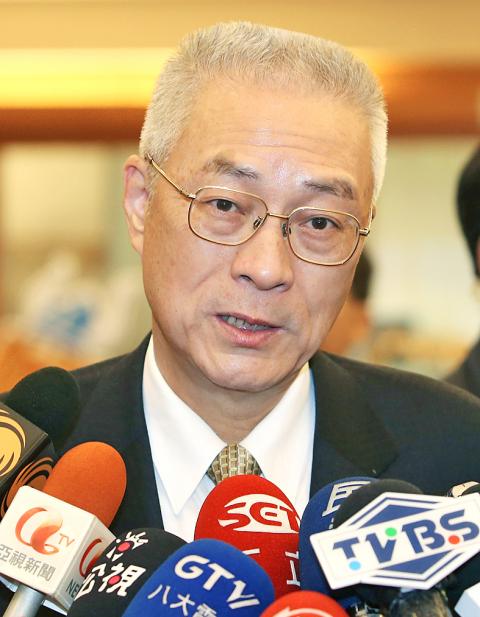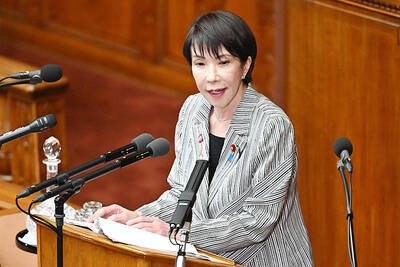Vice President Wu Den-yih (吳敦義) resigned as one of the Chinese Nationalist Party’s (KMT) vice chairmen yesterday to shoulder his share of responsibility for the party’s massive defeat in Saturday’s nine-in-one elections.
The announcement came a day after Taipei Mayor Hau Lung-bin (郝龍斌) also quit as a KMT vice chairman to assume partial blame for the electoral loss, which saw the party winning in only one of the nation’s five special municipalities — New Taipei City — and just five of the 16 cities and counties contested.
Amid calls for President Ma Ying-jeou (馬英九) to step down as KMT chairman, New Taipei City Mayor Eric Chu (朱立倫) — another vice chairman — yesterday said the party must reflect on how it can change and what role it will play before it considers any candidates for the chairmanship, or else it would only confirm the public’s view that it is unable to change.

Photo: CNA
The results of Saturday’s polls reflected the public’s disappointment in the KMT, Chu said, adding that the party must reflect on how to change itself and adapt to a new generation.
Chu asked the public to not give up on the KMT and give it another chance to prove itself in their eyes, adding that the nation needs a healthy two-party system.
When asked whether he would take up the mantle of party chairman to enact internal reforms, Chu said that the KMT must first reconsider its role, what it wants to achieve and how the chairman post fits into its grand scheme.
“To immediately consider who should run for party chairman and who should not will only lead people to retain their negative impression of the party,” Chu said, adding that the KMT must let the public know it is capable of change and of meeting the expectations of the next generation.
When pressed for an answer, Chu said he would not run from responsibility, but stressed that the party still has a long way to go and much to learn from civic organizations around the world.
Meanwhile, KMT Legislator Lo Ming-tsai (羅明才) said that only if someone new takes over as party chairman would the KMT have a chance to redeem itself.
“The party chairman can be anyone: Chu, [Legislative Speaker] Wang Jin-pyng (王金平) or Wu, but Ma must go,” Lo said.
Additional reporting by CNA

The Central Weather Administration (CWA) yesterday said it expected to issue a sea warning for Typhoon Fung-Wong tomorrow, which it said would possibly make landfall near central Taiwan. As of 2am yesterday, Fung-Wong was about 1,760km southeast of Oluanpi (鵝鑾鼻), Taiwan’s southernmost point, moving west-northwest at 26kph. It is forecast to reach Luzon in the northern Philippines by tomorrow, the CWA said. After entering the South China Sea, Typhoon Fung-Wong is likely to turn northward toward Taiwan, CWA forecaster Chang Chun-yao (張峻堯) said, adding that it would likely make landfall near central Taiwan. The CWA expects to issue a land

Taiwan’s exports soared to an all-time high of US$61.8 billion last month, surging 49.7 percent from a year earlier, as the global frenzy for artificial intelligence (AI) applications and new consumer electronics powered shipments of high-tech goods, the Ministry of Finance said yesterday. It was the first time exports had exceeded the US$60 billion mark, fueled by the global boom in AI development that has significantly boosted Taiwanese companies across the international supply chain, Department of Statistics Director-General Beatrice Tsai (蔡美娜) told a media briefing. “There is a consensus among major AI players that the upcycle is still in its early stage,”

The Central Weather Administration (CWA) yesterday said it is expected to issue a sea warning for Typhoon Fung-wong this afternoon and a land warning tomorrow. As of 1pm, the storm was about 1,070km southeast of Oluanpi (鵝鑾鼻), Taiwan’s southernmost point, and was moving west-northwest at 28 to 32kph, according to CWA data. The storm had a radius of 250km, with maximum sustained winds of 173kph and gusts reaching 209kph, the CWA added. The storm is forecast to pass near Luzon in the Philippines before entering the South China Sea and potentially turning northward toward Taiwan, the CWA said. CWA forecaster Chang Chun-yao (張峻堯) said

Japanese Prime Minister Sanae Takaichi yesterday said that China using armed force against Taiwan could constitute a "survival-threatening situation" for Japan, allowing the country to mobilize the Japanese armed forces under its security laws. Takaichi made the remarks during a parliamentary session while responding to a question about whether a "Taiwan contingency" involving a Chinese naval blockade would qualify as a "survival-threatening situation" for Japan, according to a report by Japan’s Asahi Shimbun. "If warships are used and other armed actions are involved, I believe this could constitute a survival-threatening situation," Takaichi was quoted as saying in the report. Under Japan’s security legislation,